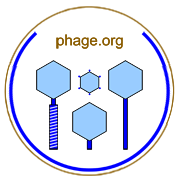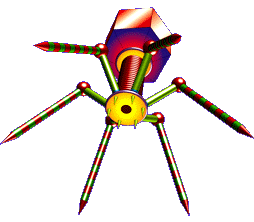

Discovered in 1915 by Twort and independently by d’Hérelle in 1917, bacteriophages were initially studied for their therapeutic potential, later as molecular models, and later still for their contribution to the world’s ecology.
For reprints of these seminal articles, see Twort (1915) and d’Hérelle (1917). For a fairly comprehensive list of phage monographs, from 1921 to present, see the Wikipedia Phage Monographs page.
The following references that discuss phage history include the following. Please let me know of additional articles, including obituaries, biographies, and autobiographies that might be included.
Kuchment, A. 2012. The Forgotten Cure: The Past and Future of Phage Therapy. Springer, New York. [Google Books]
Lavigne, R. and J. Robben 2012. Professor Dr. Richard Bruynoghe: A 1951 overview of his bacteriophage research spanning three decades. Bacteriophage 2:1-4. [PubMed]
Abedon, S. T., C. Thomas-Abedon, A. Thomas, and H. Mazure. 2011. Bacteriophage prehistory: Is or is not Hankin, 1896, a phage reference? Bacteriophage 1:174-178. [PubMed]
Summers, W. C. 2011. In the beginning... Bacteriophage 1 :50-51. [PubMed]
Dublanchet, A. and E. Fruciano. 2008. [A short history of phage therapy]. Med. Mal Infect. 38:415-420. [PubMed]
Stahl, F. 2008. The phage mating theory, with lessons for yeast geneticists. Genetics 180:1-6. [PubMed]
Prangishvili, D. 2007. Editorial: the 90th anniversary of "bacteriophage". Res. Microbiol. 158:551-552. [PubMed]
Häusler, T. 2006. Viruses vs. Superbugs: A Solution to the Antibiotic Crisis. Macmillan. [Google Books]
Holmes, F. L. and W. C. Summers. 2006. Reconceiving the Gene: Seymour Benzer's Adventures in Phage Genetics. Yale University Press, New Haven, CT. [Google Books]
Murray, N. E. 2006. The impact of phage lambda: from restriction to recombineering. Biochemical Society Transactions 34:203-207. [PubMed]
Pennazio, S. 2006. The origin of phage virology. Riv Biol 99:103-129. [PubMed]
Summers, W. C. 2006. Phage and the genesis of molecular biology, p. 3-7. In: R. Calendar and S. T. Abedon (eds.), The Bacteriophages. 2 ed. Oxford University Press, Oxford. [Google Books]
Young, R., T. M. Henkin, and C. L. J. Turnbough. 2006. The phage meeting: Classical venue, new momentum. J. Bacteriol. 188:4597-4600. [PubMed]
Summers, W. C. 2005. Bacteriophage research: early research, p. 5-28. In: E. Kutter and A. Sulakvelidze (eds.), Bacteriophages: Biology and Application. CRC Press, Boca Raton, Florida. [Google Books]
Summers, W. C. 2005. History of phage research and phage therapy, In: M. Waldor, D. Friedman, and S. Adhya (eds.), Phages: Their Role in Bacterial Pathogenesis and Biotechnology. ASM Press, Washington DC. [Google Books]
Edgar, B. 2004. The genome of bacteriophage T4: an archeological dig. Genetics 168:575-582. [PubMed]
Nossal, N. G., J. L. Franklin, E. Kutter, and J. W. Drake. 2004. Gisela Mosig. Genetics 168:1097-1104. [PubMed]
Stahl, F. W. 2001. Alfred Day Hershey. Biogr. Mem. Natl. Acad. Sci. 80:142-159. [Publisher]
Abedon, S. T. 2000. The murky origin of Snow White and her T-even dwarfs. Genetics 155:481-486. [PubMed]
Stahl, F. W. 2000. We can sleep later: Alfred D. Hershey and the Origins of Molecular Biology. Cold Spring Harbor Laboratory Press, Cold Spring Harbor, NY. [Google Books]
Summers, W. C. 1999. Felix d'Herelle and the Origins of Molecular Biology. Yale University Press, New Haven, Connecticut. [Google Books]
Campbell, A. and F. W. Stahl. 1998. Alfred D. Hershey. Genetics 32:1-6. [PubMed]
Messelson, M. S. and F. W. Stahl. 1998. Young Jan. Genetics 148:1413-1414. [PubMed]
Stahl, F. W. 1998. Hershey. Genetics 149:1-6. [PubMed]
Stahl, F. W. 1998. Recombination in phage lambda: one geneticist's historical perspective. Genetics 223:95-102. [PubMed]
Stahl, F. W. 1995. The amber mutants of phage T4. Genetics 141:439-442. [PubMed]
Stahl, F. W. 1995. George Streisinger - December 27, 1927-September 5, 1984. Biogr. Mem. Natl. Acad. Sci. 68:353-361. [PubMed]
Campbell, A. M. 1993. Thirty years ago in Genetics: Prophage insertion into bacterial chromosomes. Genetics 133:433-438. [Publisher]
Summers, W. C. 1993. How bacteriophage came to be used by the Phage Group. J. Hist. Biol. 26:255-267. [Publisher]
Summers, W. C. 1993. Plague and cholera in India: The bacteriophage inquiry of 1928-1936. J. Hist. Med. All. Sci. 48:275-301.
Twort, A. 1993. In Focus, Out of Step: A Biography of Frederick William Twort F.R.S. 1877-1950. A. Sutton, Dover, NH. [Google Books]
Delbrück, M. 1992. A physicist looks at biology, p. 9-22. In: J. Cairns, G. S. Stent, and J. D. Watson (eds.), Phage and the Origins of Molecular Biology (expanded edition). Cold Spring Harbor Laboratory Press, Cold Spring Harbor, NY. [Google Books]
Doermann, A. H. 1992. The eclipse in the bacteriophage life cycle, p. 79-87. In: J. Cairns, G. S. Stent, and J. D. Watson (eds.), Phage and the Origins of Molecular Biology (expanded edition). Cold Spring Harbor Laboratory Press, Cold Spring Harbor, NY. [Google Books]
Luria, S. E. 1992. Mutations of bacteria and of bacteriophage, p. 173-179. In: J. Cairns, G. S. Stent, and J. D. Watson (eds.), Phage and the Origins of Molecular Biology (expanded edition). Cold Spring Harbor Laboratory Press, Cold Spring Harbor, NY. [Google Books]
Stent, G. S. 1992. Introduction: Waiting for the paradox, p. 3-8. In: J. Cairns, G. S. Stent, and J. D. Watson (eds.), Phage and the Origins of Molecular Biology (expanded edition). Cold Spring Harbor Laboratory Press, Cold Spring Harbor, NY. [Google Books]
van Helvoort, T. 1992. Bacteriological and physiological research styles in the early controversy on the nature of the bacteriophage phenomenon. Med. Hist. 36:243-270. [PubMed]
van Helvoort, T. 1992. The controversy between John H. Northrop and Max Delbrück on the formation of bacteriophage: bacterial synthesis or autonomous multiplication? Ann. Sci. 49:545-575. [PubMed]
Twort, A. E. P. 1990. The career of F.W. Twort. Nature 343:504. [PubMed]
Stahl, F. 1989. The linkage map of phage T4. Genetics 123:245-248. [PubMed]
Duckworth, D. H. 1987. History and basic properties of bacterial viruses, p. 1-43. In: S. M. Goyal, C. P. Gerba, and G. Britton (eds.), Phage Ecology. John Wiley and sons, New York, NY. [Google Books]
Campbell, A. M. 1986. Bacteriophage lambda as a model system. Bioessays 5:277-280. [Publisher]
Stahl, F. W. 1985. George Streisinger (December 27, 1927-August 11, 1984). Genetics 109:1-2. [Publisher]
Luria, S. E. 1984. A Slot Machine, a Broken Test Tube: An Autobiography. Harper & Row, Publishers, New York. [Google Books]
Doermann, A. H. 1983. Introduction to the early years of bacteriophage T4, p. 1-7. In: C. K. Mathews, E. M. Kutter, G. Mosig, and P. B. Berget (eds.), Bacteriophage T4. American Society for Microbiology, Washington, DC. [Google Books]
Duckworth, D. H. 1976. "Who discovered bacteriophage?". Bacteriol. Rev. 40:793-802. [PubMed]
Raettig, H. 1967. Bakteriophagie 1957-1965 (Bacteriophagy 1957-1965). G. Fischer, Stuttgart. [Google Books]
Cairns, J., G. Stent, and J. D. Watson. 1966. Phage and the Origins of Molecular Biology. Cold Spring Harbor Laboratory Press, Cold Spring Harbor, NY. [Google Books]
Stent, G. S. 1960. Papers on Bacterial Viruses. Little, Brown and Co., Boston. [Google Books for second edition]
Raettig, H. 1958. Bakteriophagie, 1917 bis 1956; Zugleich ein Vorschlag zur Dokumentation wissenschaftlicher Literatur. G. Fischer, Stuttgart. [Google Books]
Lwoff, A. 1953. Lysogeny. Bacteriol. Rev. 17:269-337. [PubMed]
Compton, A. 1949. Felix d'Herelle (Obituary). Nature 163:984-985.
Twort, F. W. 1949. The discovery of the bacteriophage. Sci. News (Harmondsworth, London) 14:33-34.
Flu, P. C. 1946. The Bacteriophage: A Historical and Critical Survey of 25 Years Research. Universitaire Pers Leiden, Leiden. [Google Books]
Topley, W. W. C. 1925. The bacteriophage phenomenon: transmissible bacterial lysis. Memoirs and proceedings - Manchester Literary and Philosophical Society
69:61-71. [Reprint]
For more on this topic, see Wikipedia, Google, and PubMed. Contact web master. Return to terms.